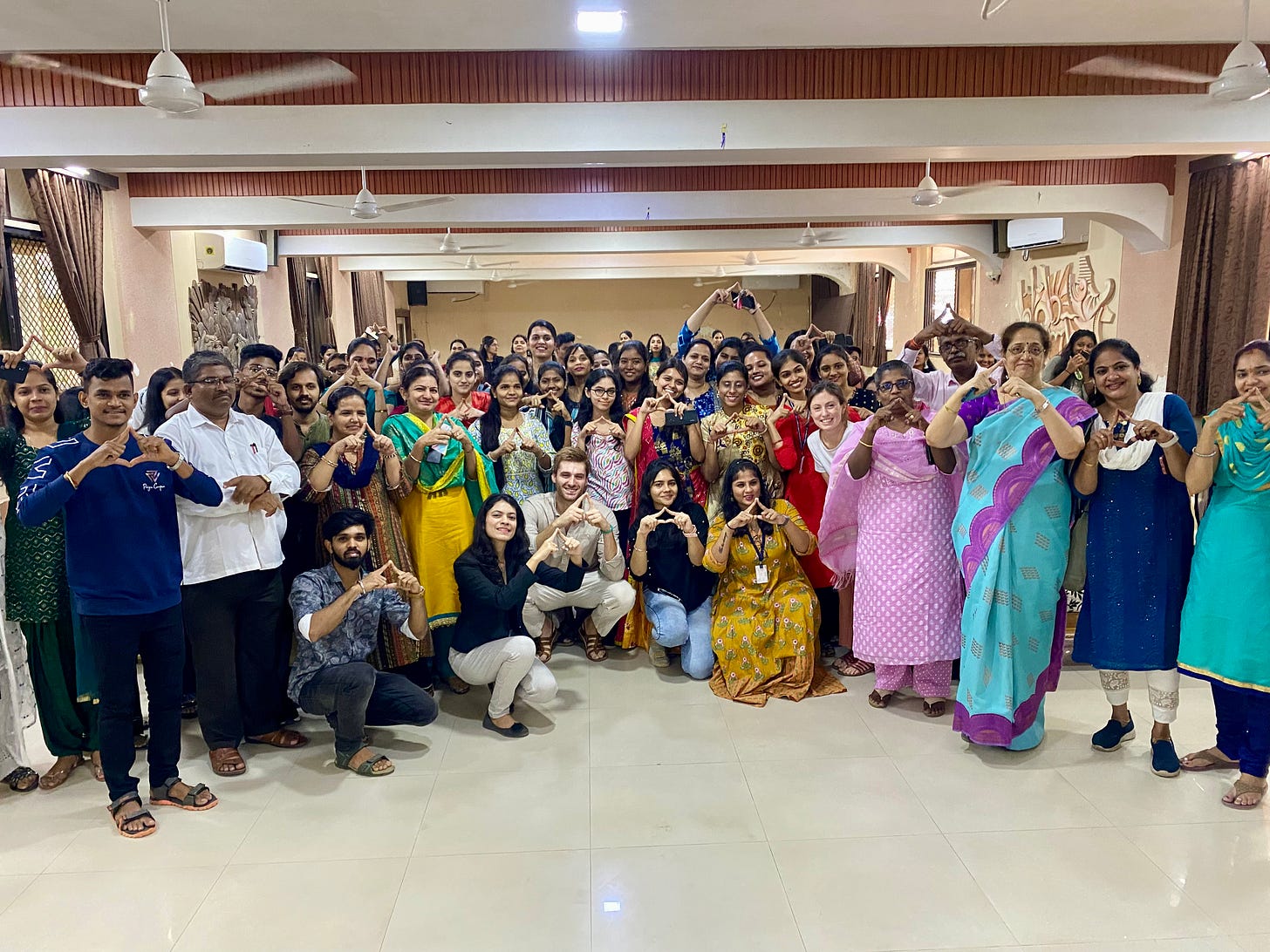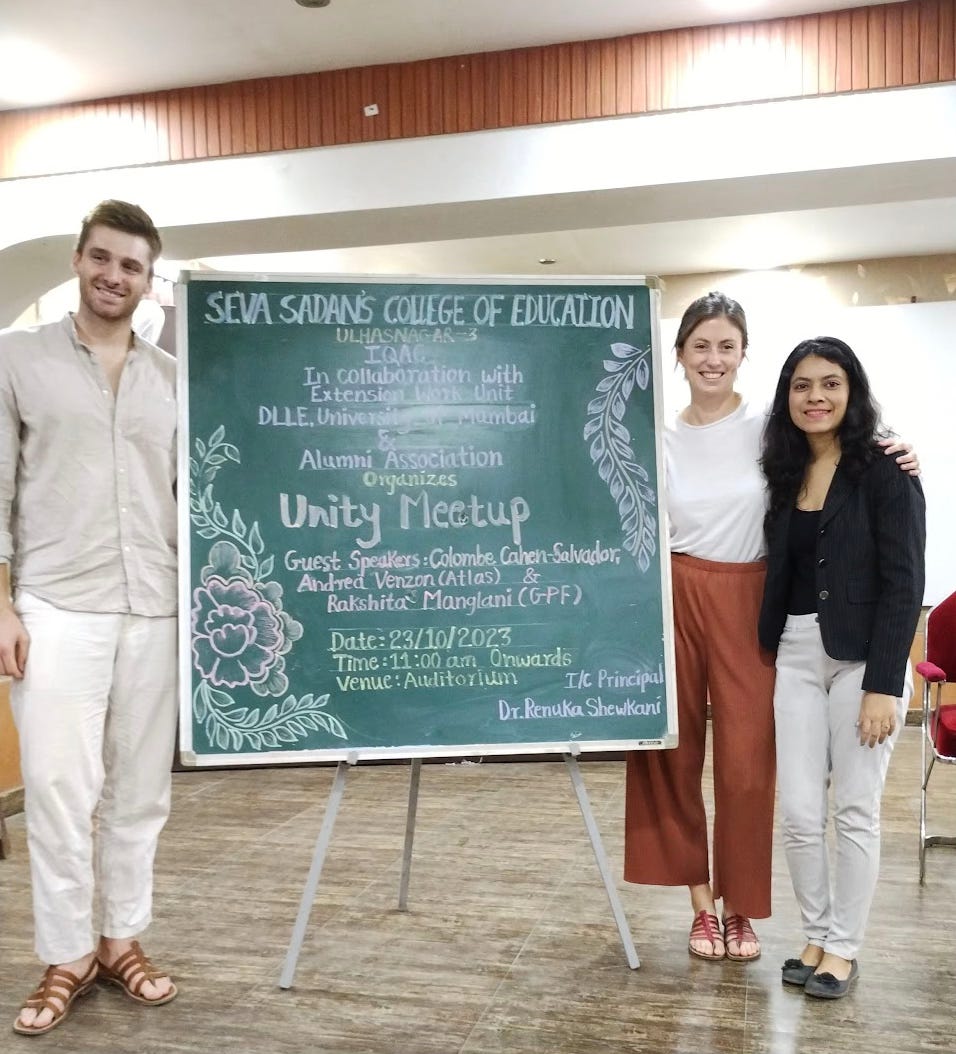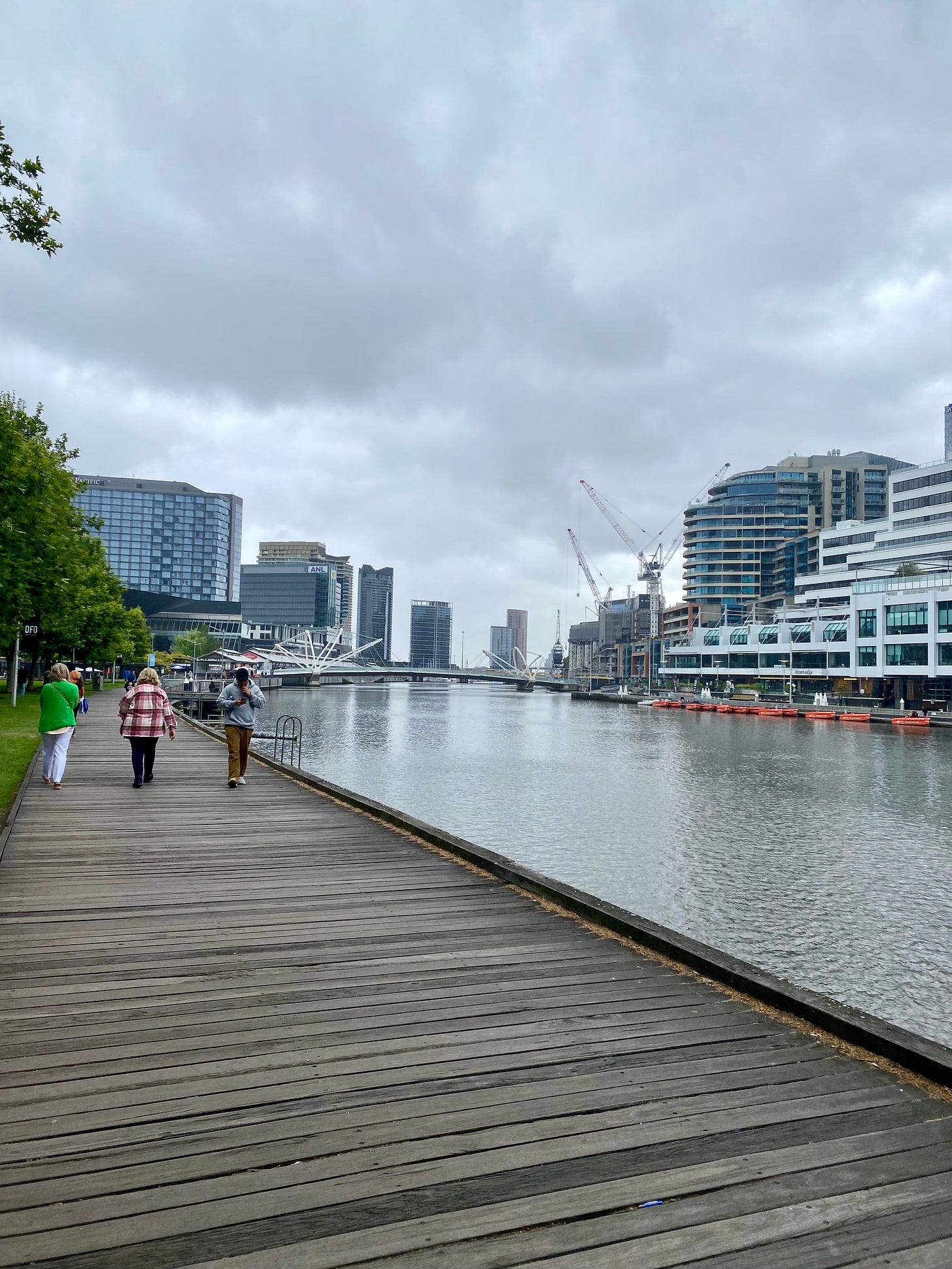Life on the road: enough talking, direct actions can change politics!
And how I’ve become even more convinced that global politics is the way forward after experiencing what it could mean in India.
Dear friends,
Andrea and I left India after a month spent working with volunteers on the ground, meeting with activists and politicians, learning about best practices on how, for example, to achieve greater solidarity or keep freedom struggles alive, and trying to understand this enormous country better. And despite the darkness and loss of humanity happening right now in places like Palestine, I regained political hope.
Over the last month, I’ve become even more convinced that global politics is the way forward after experiencing what it could mean in India. And I gathered some really cool lessons from activists, politicians and students on how to best impact change, so read on!
🇮🇳 Destination: India
Over the last month,
and I travelled across India to meet, speak, learn from and organise with people on the ground. As you can read in previous posts, we learnt about the authoritarian tendencies of Modi’s government; how freedom struggles can keep their legitimacy and credibility alive through a government in exile; the need for Truth and Reconciliation worldwide, and more! But something that I haven’t talked about yet is some of the lessons that we’ll be applying in our work at Atlas in the future. So here it comes!Note: India is so vast and diverse that it might take a foreigner many years to start to understand it well. Thanks to our many meetings with political activists, lawyers, politicians and citizens, we might have some understanding of the situation, but no way this is comprehensive!
Recap of the last month:
Delhi | We met lots of civil society and political representatives. More importantly, we spent time with the team and held our launch event there. Full recap here.
Dharamshala | We spent a few days with the Tibetan Government in Exile to understand how to best support freedom struggles and learn from their democratic odyssey. Full recap here.
Amritsar | We headed there to learn how to practice solidarity at scale and about the partition history of India and Pakistan. Full recap here.
Rajasthan | We visited!
Mumbai | We hosted a second public event and discovered the financial heart of India.
Bangalore | We ended the trip there to see the IT capital and held a final meeting with an opposition leader.
Four key takeaways for a Global Political Party:
I - A Government in Exile for Freedom Struggles might be a model to follow!
Meeting with officials of the Tibetan Government in Exile showed us the importance of creating platforms for freedom struggle to gain legitimacy and last in the long run. The model of the Tibetans could be used for many other freedom struggles (and perhaps causes?) across the planet.
As I mentioned in this post, “freedom struggles often last decades, if not longer (it's been 64 years of occupation for Tibet and 56 for Palestine). As Nelson Mandela said, “There is no easy walk to freedom anywhere, and many of us will have to pass through the valley of the shadow of death again and again before we reach the mountaintop of our desires.” This means that those working to end oppression and to regain access to their rights and freedoms are often delegitimised, ignored, and split themselves into factions and more. It is also hard for them to stay at the service of their people while fighting such big struggles. A Government in Exile provides some answers to those issues
some people hold clear legitimacy to represent the interest of a group in front of the international community, and
through regular elections, they continue to represent their people and can best support them.
Obviously, it doesn't apply to all struggles equally. As I was told, for a government in exile to succeed:
most groups involved in the struggle must find a minimum common denominator behind which to rally and then build from there. Otherwise, such a government cannot be taken seriously. This means egos must be put aside and ideological differences ignored for a while.
it needs to be big enough for it to function properly. this is obviously difficult for many freedom struggles that have a hard time securing financing for their basic needs, let alone a government in exile.”
II - The power of direct actions should not be underestimated
Over and over again, we hear politicians speak. We hear them nonstop. But do words translate into actions? Not often enough. Yet, serving people is the basis of a politician’s job. They traditionally do so through policies and reforms, rightfully so. But it doesn’t have to stop there. Serving people can also be done through direct actions: by providing direct services to populations in need.
We were incredibly impressed by the fact that Sikh Temples provide free meals to people of all kinds, and especially the Golden Temple (the one we visited), which provides 100,000 meals/day. This made us reflect on the power of direct actions: not only talking about doing the right thing for people but also starting to help out in any way possible. Consider what we could achieve if our public policies and governmental attention were focused on serving those most in need, creating solidarity and striving for collective well-being?!
At Atlas, we strive for this. Well-being, equity and freedom are our reason to exist. And we want to push for it in power but not only. Inspired by learnings in India, we are planning a new stream of work: direct services! More details coming in December, but don’t hesitate to reach out to be involved before that :)
III - Walks are still a great political medium to gather millions, learn about the complexities of a country, and shed light on its issues
You must have heard about Gandhi’s walk. “On March 12, 1930, Gandhi and his followers began walking from Sabarmati Ashram to the seacoast town of Dandi, Gujarat. They were protesting the British monopoly on salt production in India, which caused high prices and poor-quality salt for Indian consumers.”
More recently, Raoul Gandhi marched to revitalise the opposition. Politicians sometimes perform long walks across a country to connect with people, learn about their own countries and difficulties, and bring their message to the grassroots.
It’s something that we could bring to other countries/cultures as it truly encapsulates the real meaning of grassroots politics.
IV - Good leaders must be sought
Lastly, we cannot ignore the role that leaders (aka faces) play in Indian politics. But not only. Whether we like to admit it or not, we look up to people, identify with people, and vote for people. Not just policies or parties.
While often perceived negatively because of the cult of the strong man in many countries, working to promote good leaders can actually be an advantage and have a positive outcome if done properly. Good leaders are not wanna be gods but people that others can trust, relate to, and that have been trained to do their jobs. You aren’t born a policy writer nor with an understanding of how to gather by-partisan support without compromising on your core principles. Those skills can be learned, while one’s political values and earnestness to serve others must be innate. Finding, training and bringing to the top good leaders is something that progressives sometimes shy away from. Still, it seems to be a necessary strategy to break through the noise.
📣 The political corner: global politics from India to the world
While in Mumbai, we held an event at Seva Sadan's College of Education to talk and debate whether students’ main social concerns could be addressed through global politics. Spoiler alert: yes.
Something that is on top of the minds of all the young people I spoke with, besides the lack of economic opportunities, is climate and pollution. Air pollution is so bad in major Indian cities. “Air pollution in India is estimated to kill about 2 million people every year; it is the fifth largest killer in India.”
Just like every time I speak to people about the problems they face in their cities, regions, or countries, I immediately see parallels with others. those concerns are the same in cities that I’m more familiar with, like Milan, which is the most polluted city in Europe. Friends have issues breathing well some days on both sides of the world. They are concerned about their children’s future health in both countries. Yet, said countries barely collaborate not only in solving the underlying causes of the issue (pollution) but in sharing best practices, lessons learnt, and doing better.
One of the reasons for building Atlas in the first place is the fact that worldwide, we face similar challenges, have the same hopes and dreams, and can support one another across the world. Put simply, our diversity is a strength, and together we can achieve the unimaginable. Yet, it never stops to amaze me that whenever speaking with people across the world at our event, they mention the exact same issues regardless of the countries they come from. Cost of living, security, health, climate. The degree of severity of such issues may vary, but they all want the same thing: a life with purpose, where they can live healthy with the ones they love. And when talking a bit more, when I point this out, they say: of course, we are One at the end of the day, there is no reason to be divided.
Together, United, We Cannot be Defeated! So let’s join forces politically. let’s find ways to solve our common challenges. Let’s do better!
💫 Next up: Melbourne 🇦🇺
For the next three weeks, we’ll be based in Australia to do the same thing as in India: understand how to build a global political party to be able to harness our collective energy for equity, well-being and freedom! And yes, finally, deal with global issues like climate change (as I’m writing this, bushfires are devastating again Australia).
We also want to learn more about the many new political and democratic initiatives happening in the country, talk to people who organised the Voice Referendum and learn from it, and explore Australia’s foreign policy on authoritarianism/China.
Yes, it’s a busy schedule! Unlike in India, we don’t have a team pushing Atlas forward, but we do have members and volunteers supporting our work in an isolated manner. We want to change this and start planting the seed for more, for a political party in Australia working alongside others worldwide to quell inequities, redistribute wealth and power, and unite beyond borders to solve global challenges.
That’s why we’ll host public events in Melbourne, Canberra & Sydney - find the details here - join us and spread the word! And if you know people we should meet, reach out!
Let me know what you think, send me your feedback and ideas, and don’t forget to take action to unite the world.
One way is to join or donate to Atlas, the global political party uniting people worldwide to create a freer, better and more equitable world (click here)!
Cheers,
Colombe








thanks for the recap!